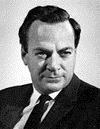On December 29, 1959, when physicist Richard Feynman stood behind a podium at the annual meeting of the American Physical Society to give his talk, There's Plenty of Room at the Bottom, the IBM Series 7000 computer was the top of the line model for scientific computing.
It cost $2.9 million and could store up to 100,000 characters of code in its core registry. The integrated circuit developed by Jack Kilby was barely a year old, and wasn't yet in widespread use.

Everyone in the room wanted bigger and better technology -- more storage, more memory, more processing power. But Feynman told them that instead of thinking big, they should be thinking small. He believed that by the year 2000, scientists would be manipulating matter at the atomic level, building tiny devices that would revolutionize medicine and manufacturing.
In a new blog post from Nanotronics Imaging, the company looks at how Feynman's challenge to science to "think small" has played out over the last 55 years. Nanotronics CEO Dr. Matthew Putman says, "As Richard Feynman said, 'it is not enough to see the small - you need to see the small in the large'.
"To create the kind of optical imaging we have today, we needed to combine the very best optical hardware and completely new software. Now we can start to realize the benefits that Feynman predicted so long ago," Putman adds.
You can read the complete blog post by clicking on this link. Demonstration videos highlighting the breakthrough optical imaging and optical microscopy tools that Nanotronics is now delivering for the semiconductor and medical industries are available at this link.
About Nanotronics Imaging
Nanotronics Imaging is a high-tech, cutting edge, microscopy and software company delivering rapid testing and analysis solutions to sectors ranging from materials science, and semiconductors to life science and medicine. Nanotronics Imaging nearly quadrupled business in 2012 offering tremendous value and efficiency to inspection systems in the semiconductor sphere. The company was founded in 2010 by CEO Matthew Putman, Ph.D., former professor of materials science and engineering at Columbia University and John Putman, former CEO of the automated instrumentation company Tech Pro, which was sold to Roper Industries in 2008.